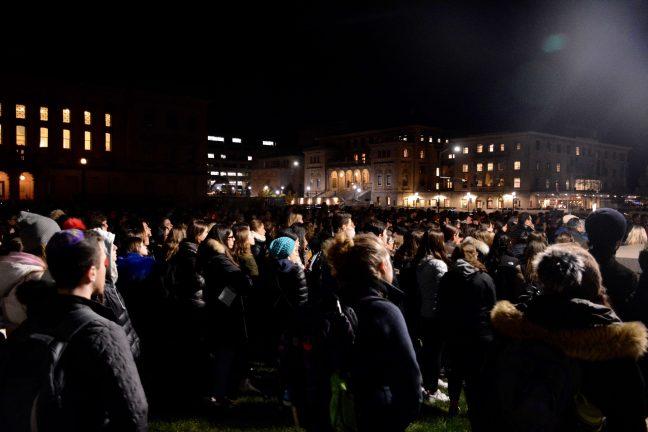Two weeks ago, what I thought was an easy-going conversation with my friends quickly turned sour.
“Abby,” my friend laughed, “Jews can’t be a minority — you’re all white!”
My mind quickly flashed to two of my cousins, both people of color who attend Jewish day school and read more Torah than Twitter — who wear their Judaism and their race like badges of pride rather than contradicting identities. My friend’s sentiment is an erasure of my cousin’s and all non-white Jews’ identities. But I thought to myself that there’s no point in arguing with close-minded people because they’ll never change. So I decided not to waste my breath and let it slide.
The next week, I jumped on a plane and headed to Baltimore — or rather, Pikesville, Maryland, a beautiful bastion of Judaism like I had never experienced before. Within a two block radius was four synagogues, each holding a tightly-knit, God-fearing community — communities strikingly similar to that of Squirrel Hill in Pittsburgh.
As the morning’s Shabbat service came to a close and my cousin became a Bar Mitzvah, my phone buzzed and I got a news alert. As my family embraced each other, dancing and celebrating a beautiful simcha, or celebration, I could not summon the joy to participate. Eleven Jews were shot at the Tree of Life Synagogue in Pittsburgh, Pennsylvania. Eleven Jews just like us, observing the Sabbath, celebrating a simcha just as we were, lost their lives because of hatred, bigotry and extremism.
I don’t know why this didn’t happen to me besides the fortunate coincidence I was three hundred miles east. I don’t know why I was lucky enough to end the day with a Kiddush luncheon rather than a trip to the morgue. There is no security, no comfort and no logic anymore. After Saturday morning, Jews across America grapple with the unthinkable.
An easy way to rationalize that which makes little sense is to blame others. To an extent, that’s valid. Come any tragedy, we blame the people in charge. As quickly as the incident reports came in, so did the editorials, op-eds and letters to the editor blaming President Donald Trump for creating a culture where extremism, anti-immigration sentiment, ignorance and blatant racism are viewed as commonplace and accepted in conversation and mainstream media. Though the ferocity and bluntness of Trump’s prejudices are unprecedented in modern American collective memory, the toxic culture that led to the Tree of Life massacre has been ruminating for years. No one is solely responsible for what happened there. We know Robert Bowers is to blame, for he carried the gun, shouted the obscenities and fired the bullets. But other than that, throwing sole blame on any other figure, especially the Trump administration, is irresponsible.
This sentiment is not in defense of the Trump administration, for the toxic rhetoric they spew does have a significant influence on the toxicity of our culture. But it is far too easy just to blame the bigots. It is much harder, and therefore much more valuable, to recognize the fault in ourselves.
No culture is created by one individual. Rather, culture is the byproduct of the interaction between societal norms, shared public opinion and social desirability. The conscious choices we make build into greater societal trends until they become normal. Extremism did not become acceptable overnight — rather it was the culmination of many small efforts that legitimized it.
Maybe it was this country’s intense hatred of political correctness. By berating and invalidating inclusive language, we make it OK to use rude, bigoted phrases. This is the first step to legitimize extremist ideologies. Maybe it was the popular excuse “It’s my right to free speech,” though the first amendment says nothing about protecting hate speech. Maybe it was our passivity and desire for social acceptance. I find myself more guilty of this than I’d like to be. I should have called my friend out for her close-mindedness. I should have educated her. I should have explained all the negative implications her misinformation could create. But instead I was passive. Instead, I decided letting her think in her backward way was easier than creating conflict by telling the truth.
These small acts of bigotry or passivity fester into the toxic culture that allowed Roger Bowers to think murdering people would be a positive act. Though not directly, we are all responsible. But if we built this culture together, we have the power to end it. Stand against all acts of bigotry, racism and anti-Semitism, both big and small. No one person has the power to make this change alone. It is only together we can make sure the 11 victims did not die in vain.
Abigail Steinberg (asteinberg@badgerherald.com) is a sophomore majoring in political science and intending to major in journalism.


